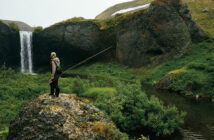Saltwater recreational fishing continued to provide important economic benefits to America’s coastal communities in 2008, bringing fishermen to the shore to reel in fish, book spots on charter and party boats, buy bait and tackle, stay in local inns and eat at local restaurants, according to a report issued this week by NOAA’s Fisheries Service.
Saltwater recreational anglers took an estimated 85 million fishing trips in 2008, down slightly from the 93 million trips estimated in 2007. Saltwater anglers caught an estimated 464 million fish in 2008, down slightly from the 475 million caught in 2007. That the decreases were moderate reflects stability in saltwater angling.
“Saltwater recreational fishing is one of the most popular outdoor sports in America, and those who take part in it bring economic vitality to coastal towns and cities,” said NOAA Administrator Dr. Jane Lubchenco, who remembers her first experiences saltwater fishing for salmon with her father aboard a charter boat off the Oregon coast. Saltwater angling generates an estimated $82 million in sales and supports more than 500,000 jobs annually, according to the most recent figures available to NOAA.
“Last year we had gas prices around $4 a gallon and people did not go fishing as they had in 2007,” said Captain Scott Lindsey, a recreational fisherman and outdoor writer based in Panama City,Fla. “All in all, I believe the quality of the fish this year is better and the size of the fish we’re catching is larger than we have seen in many a year. Is it cyclical or management? We’ll have to wait and see.” Frank Blount, owner of the Frances Fleet of party boats in Point Judith, R.I. and a member of the New England Fishery Management Council, also saw a decline in fishing business in 2008 that he estimates around 20 percent. “Surprisingly enough, we’ve had a very good early spring this year. I’m especially seeing a lot of our regular customers from the Northeast states. I think it’s due to good availability of many fish we pursue.”
“Saltwater anglers have their eyes on the water and a vested interest in sustaining fishing opportunities for their children and grandchildren,” Lubchenco added. “They are natural champions for ocean stewardship.” Saltwater anglers demonstrated their conservation ethic by catching and releasing back into the water some 58 percent of the 2008 catch, slightly up from 57 percent in 2007, today’s report said.
NOAA’s report also tallied the top catches by region.
Spotted seatrout was the most popular catch among marine recreational anglers in 2008. The species is caught in the Gulf of Mexico and the south Atlantic regions, which have the highest combined concentration of saltwater anglers in the nation. The top catches in other regions were grouper (Caribbean), striped bass (North Atlantic), summer flounder (Mid-Atlantic), chub mackerel (Pacific), black rockfish (Pacific Northwest), skipjack tuna (Western Pacific).
The reported catch and effort statistics are compiled by NOAA’s Fisheries Service from face-to-face and telephone interviews with recreational fishermen. Currently, NOAA is working with the coastal states and those in the saltwater angling community to redesign the agency’s surveys to provide a more complete picture of saltwater anglers’ catch and effort and improve the conservation of our shared ocean resources.
The data released today on recreational fishing is part of Fisheries of the United States, a detailed annual report on the nation’s commercial and recreational fishing, landings, export, per capita fish consumption and consumer expenditures for fish products. The report will be available online and can be read at http://www.st.nmfs.noaa.gov/st1/index.html.
NOAA understands and predicts changes in the Earth’s environment, from the depths of the ocean to the surface of the sun, and conserves and manages our coastal and marine resources. Visithttp://www.noaa.gov.
On the Web:
NOAA’s Fisheries Service: http://www.nmfs.noaa.gov



